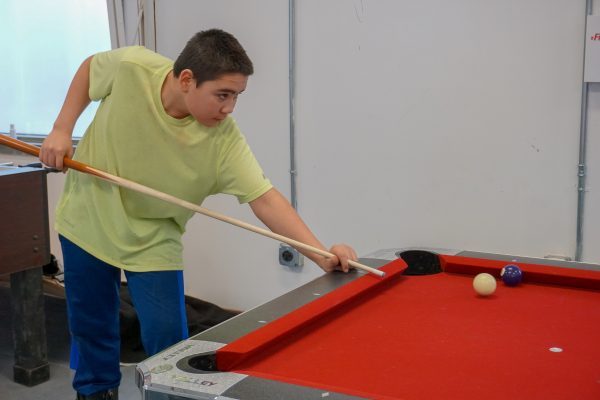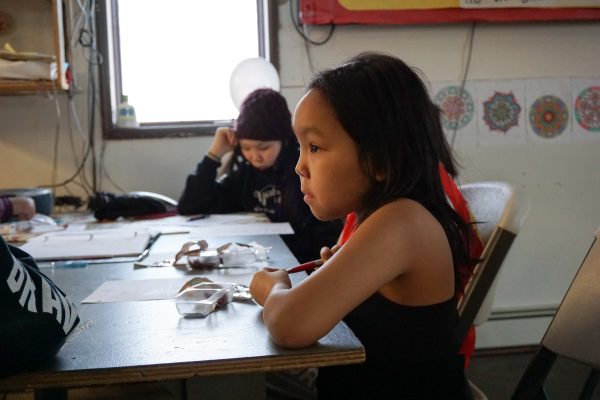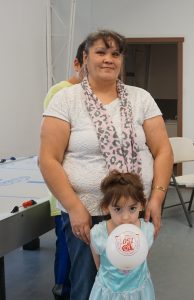
The Solutions Desk looks beyond Alaska’s problems and reports on its solutions – the people and programs working to make Alaska communities stronger. Listen to more solutions journalism stories and conversations, and share your own ideas here.
Teenager Robert Sheldon sulks in the back of the small, aging community building in Kiana, a village in the Northwest Arctic. He’s doing what many adults in many communities do all the time – sitting through a boring planning meeting.
The young teens are organizing a two-and-a-half-day-long conference for other youth in the region.
Robert says he’s only there “cause there’s nothing else to do around town.”
The goal of the group is to help young people develop leadership skills and to think about the positive ways they contribute to the community. That’s why the group’s name is One Positive Thing in Kiana, or OPT In.
As the meeting about conference logistics plods on, Robert speaks up in response to a typical question, “What’s one positive thing in Kiana from the past week?”
“Well, I delivered stove oil,” Robert says from the far edge of the room where he’s slouching on a couch. “And I was helping a blind, disabled elder, bringing their lunch every day.”
Robert may say he’s only there because there’s nothing better to do, but he gives input on the importance of teaching first aid and what the conference hoodies should look like. It seems really minor, but it turns out that allowing teens, like Robert, to make small decisions can have long-term, large effects.

Research shows that when young people are in charge of decision-making processes and have opportunities to contribute to the community in meaningful ways, they’re less likely to participate in risky behaviors, like drinking or unsafe sex. They develop into physically and mentally healthier adults who can handle challenges better.
Jeanne Gerhardt-Cyrus, the group’s adult mentor, says getting Robert to participate, even in these little ways, hasn’t been easy, which means engaging with him is even more important.
“I think every youth has potential, and we do too much of excluding youth who have behavioral issues, have academic issues, have social issues, whatever,” she says.
OPT In Kiana was created by Jeanne’s daughter, who is now in college, and is open to any kid who wants to join. Jeanne says she’s seen all of the young people grow over time. Participation varies from kids who only help out occasionally or go to social events to kids who show up at almost every meeting.
Related: Building resilience through basketballs and berries
She says the locally developed, youth-run program goes beyond providing kids necessary social supports and connections. It teaches practical skills.
“You know, these youth–I’m really excited to see them as adults because of their experience. So, they know about meetings. They know about how to organize things, take responsibility for them, and see a project from start to finish.”
“It’s hard to gain those skills if you never have the opportunity,” she says.
Their biggest project is their annual conference. This spring they hosted their third. The youth decided to feature things like workshops on sewing, being safe in the village, and applying for scholarships.
Related: After a tragedy, a Yup’ik dance group in Hooper Bay keeps dancing
After the weekly meeting ends, Robert wanders down to play air hockey at the new youth center that’s open on some weekends and afternoons.

His mom, Millie Sheldon, volunteers to chaperone. She says before joining the leadership group and attending a conference in Anchorage, Robert was acting out and making poor choices. Now, things are different.
“He is doing a lot better in our community and getting involved more with helping our community members and our elders,” she says.
Though things have improved, it doesn’t mean he’s completely stopped being a surly teenager. He’s more pleasant to have around the house, “sometimes,” she says, laughing.
She says he still complains about delivering food to elders when it’s negative 50 degrees out. But now, he does it without being asked.
Want to hear more Solutions Desk stories? Subscribe to the podcast on iTunes, Stitcher, Google Play, or NPR.
After being told innumerable times that maybe she asked too many questions, Anne Hillman decided to pursue a career in journalism. She's reported from around Alaska since 2007 and briefly worked as a community radio journalism trainer in rural South Sudan.
ahillman (at) alaskapublic (dot) org | 907.550.8447 | About Anne




